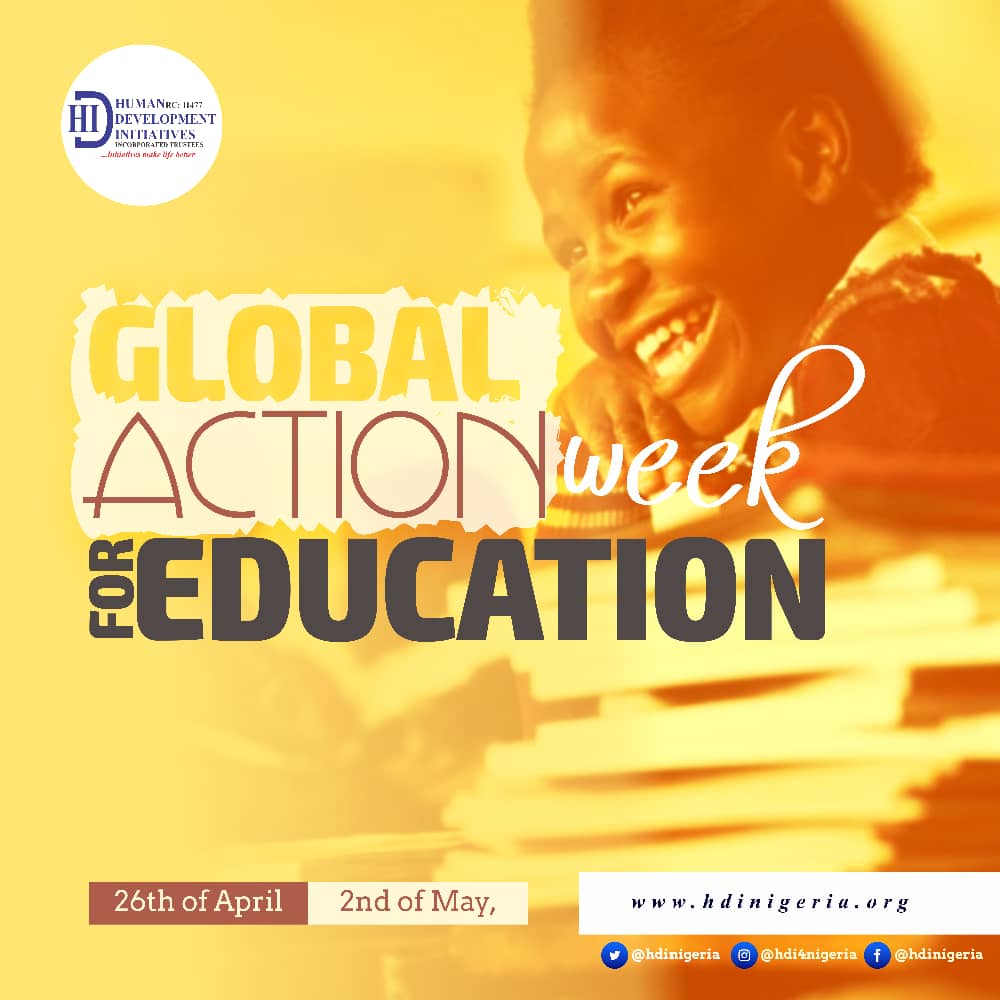PRESS RELEASE: GLOBAL ACTION WEEK ON EDUCATION 2020

PRESS RELEASE ON GLOBAL ACTION WEEK ON EDUCATION 2020
The last week in April is set aside all over the world to demand for an accessible, quality, inclusive and affordable public education. The 2020 Global Action Week on Education is tagged “10 years left to 2030: Civil society’s solutions, recommendations and plans of action to reach SDG4”. The global event which is ending today is to send a kind and sharp reminder to the Nigerian government especially at the sub-national level of the commitment made to ensure quality, equitable, inclusive education and lifelong learning for all children, among others; summarily to ensure that no child is left behind.
Nigeria accounts for more than one in five out-of-school children anywhere in the world. According to the World Health Organization, only 67 per cent of eligible children get enrolled in primary school. And If a child misses school for even a short time, the chance of such a child to ever return to school is only about 25 per cent.
Sadly, girls suffer more than boys in terms of missing out on education in Nigeria. This reality may be a little different in Lagos from what is observed in the north-east of Nigeria where only 41 per cent of eligible girls receive a primary education, and 47 per cent in the north-west.
Generally, Nigerian children are vulnerable to a wide range of abuses and harmful traditional practices including children with disabilities. The national legal framework for child protection is the Child Rights Act 2003, but to date, only 24 of 36 states have adopted the Act. The implementation of this Act is patchy with many local authority bodies unaware of their duties under the law. According to WHO only 6 out of 10 children reported having suffered one or more forms of violence before reaching 18 years of age, with 70 per cent of those experiencing multiple incidents of violence. As at today, Nigeria has the largest number of child brides in Africa: 23 million girls and women were married as children.
Unfortunately, the rampaging global pandemic, covid-19 virus has further complicated the challenges of the poor, marginalised and vulnerable children who cannot afford the basic technology to adapt to continuous learning under this lockdown; children especially girls who are locked down with their abusers and tormentors; and families who can barely survive without daily wages.
Our dear Governor, Babajide Sanwo-Olu, this years’ Global Action Week on Education is to remind you and the State House of Assembly, that five years ago the government of Nigeria made commitments to all children in Nigeria by signing unto the Sustainable Development Goals. Happily, in your recent actions to prioritised education in the Lagos State budget; your efforts to introduce e-learning into the education sector, your prompt response to the pandemic particularly activating the domestic and sexual violence hotlines in Lagos State, the radio platforms to encourage learning for children while staying at home among other steps you have taken, give us some hope that you will keep to these commitments. However, despite these efforts, it is important to note that many children, especially poor, vulnerable and marginalised children including children with disabilities are still being excluded in Lagos.
While we sincerely commend these efforts, Human Development Initiatives Nigeria, ActionAid Nigeria and other global coalition for education use this opportunity to urge the Lagos State Government to reflect on the gaps in the public education sector that this global pandemic has revealed and take advantage of the lessons from the current challenges to progressively invest more in the sector in a way that can enable all children to continue their education under similar circumstance in Lagos State. Specifically, we urge the Lagos State Government to:
- Take action to progressively increase the size of the Lagos State budget by raising fair tax.
- Take action to increase the share of the funds allocated to and spent on free, quality, equitable, and inclusive public education.
- Make public education policies, systems and expenditure more sensitive to the rights of girls and marginalized children.
- Open-up education budget and expenditure to effective public participation from the initiation stage to promote the inclusive education policy of the State
- Make school infrastructure more user friendly for people with disabilities
- Train our teachers and school administrators to handle inclusive schools
- Equip our schools with needed support systems to aid inclusive learning including a more robust teachers’ welfare that can attract the best brains into the noble profession especially at the basic level.
We are calling on all concerned Civil Society Organizations and other stakeholders to their voices to these demands for free, equitable, quality and inclusive public education in Lagos State.
Signed by:
Olufunso Owasanoye
Executive Director
Human Development Initiatives.